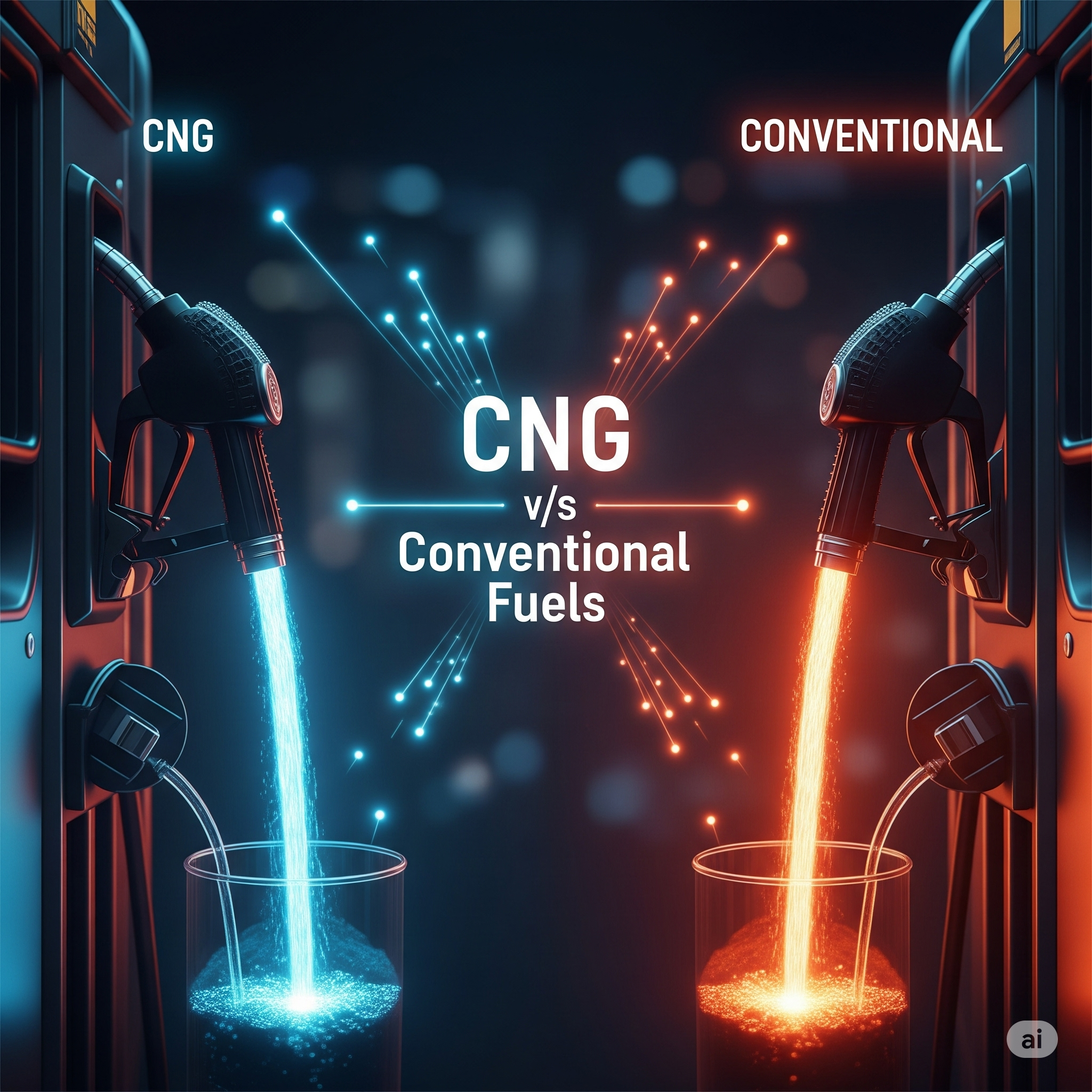Introduction
The global transportation sector is facing a transformative era as concerns over climate change, urban air pollution, and the finite nature of fossil fuels grow. Conventional fuels like petrol and diesel have dominated vehicle propulsion for over a century, but their adverse environmental and economic impacts have prompted the search for sustainable alternatives. Among these alternatives, Compressed Natural Gas (CNG) has emerged as a practical and environmentally friendly solution.
CNG, primarily composed of methane (CH₄), is stored under high pressure and used in internal combustion engines as a substitute for petrol and diesel. Its growing adoption in urban transport, logistics, and private vehicles highlights its potential as a key player in the future of sustainable mobility. This article explores the use of CNG as an alternative fuel, its advantages, limitations, technological advancements, government policies, and future prospects.
Understanding CNG
1. What is CNG?
Compressed Natural Gas (CNG) is natural gas that is compressed to less than 1% of its original volume at standard atmospheric pressure. The primary component of CNG is methane, which burns more cleanly than gasoline or diesel, producing fewer harmful emissions.
2. CNG Vehicle Types
CNG can be used in various types of vehicles:
- Dedicated CNG vehicles: Designed to run exclusively on CNG.
- Bi-fuel vehicles: Equipped to run on both CNG and conventional fuels, offering operational flexibility.
- Dual-fuel engines: Primarily diesel engines that can operate with a CNG-diesel mixture.
The versatility of CNG makes it suitable for urban buses, private cars, taxis, delivery vans, and even commercial trucks.
Advantages of CNG Over Conventional Fuels
1. Environmental Benefits
CNG is considered an eco-friendly fuel because it produces:
- Lower carbon dioxide (CO₂) emissions than petrol or diesel.
- Reduced particulate matter (PM) and nitrogen oxides (NOx), which contribute to air pollution and respiratory diseases.
- Negligible sulfur oxides (SOx), making it a cleaner alternative for urban environments.
These environmental benefits are particularly important in countries with high urban pollution levels, such as India, China, and Mexico.
2. Cost-Effectiveness
- Lower fuel costs: In many countries, CNG is 30–50% cheaper than petrol and 20–40% cheaper than diesel.
- Operational savings: Fleet operators and daily commuters save significant amounts on fuel expenses.
- Long-term ROI: Although initial costs of CNG vehicles are slightly higher, fuel savings often offset this within 1–2 years.
3. Engine Longevity and Maintenance
- Cleaner combustion leads to less carbon deposition in engines.
- Extended engine life: Engines using CNG often last longer than those running solely on petrol or diesel.
- Lower maintenance costs: Reduced engine wear translates to fewer repairs and lower servicing expenses.
4. Safety Advantages
- CNG is lighter than air, so in the event of a leak, it disperses quickly, reducing the risk of fire or explosion.
- Modern CNG vehicles are equipped with high-quality cylinders and safety valves that meet stringent regulatory standards.
5. Energy Security
- Using CNG reduces dependence on imported oil, helping countries achieve greater energy independence.
- Nations with abundant natural gas reserves can use CNG as a locally sourced fuel, stabilizing energy costs.
Disadvantages of CNG
1. Limited Infrastructure
- Refueling stations are fewer compared to petrol and diesel pumps.
- Rural areas and highways often lack CNG availability, limiting long-distance travel.
2. Reduced Vehicle Performance
- Lower energy density of CNG can result in slightly reduced engine power.
- Vehicles may have slower acceleration compared to petrol or diesel counterparts, particularly in heavy-duty applications.
3. Storage and Space Issues
- CNG cylinders occupy significant trunk space, reducing cargo capacity in cars and vans.
- Retrofitting existing petrol vehicles with CNG kits can also affect vehicle aesthetics and storage options.
4. Initial Costs
- Factory-fitted CNG vehicles are more expensive than petrol versions.
- Conversion kits for existing vehicles can be costly and require skilled installation.
5. Safety Considerations
- Improperly installed or poorly maintained cylinders can pose leak or explosion risks, although these incidents are rare.
Applications of CNG
1. Urban Public Transport
- Buses and taxis in metropolitan cities are increasingly running on CNG.
- Benefits include reduced urban air pollution and lower operational costs for transport authorities.
2. Logistics and Delivery Sector
- Delivery vans and fleet vehicles use CNG to cut fuel costs while meeting emission regulations.
- Companies like Amazon, Flipkart, and BigBasket in India have deployed CNG-powered vehicles for last-mile delivery.
3. Private Vehicles
- CNG adoption is growing among private car owners seeking cost savings and environmental benefits.
- Bi-fuel vehicles offer flexibility for city and highway driving.
4. Commercial Trucks
- Heavy-duty trucks are increasingly being converted to dual-fuel engines (CNG + diesel) to balance performance and fuel efficiency.
Government Policies Supporting CNG
1. India
- The National Green Hydrogen and Gas Policy and initiatives like SATAT promote CNG adoption.
- Subsidies and tax incentives encourage both manufacturers and consumers to shift to CNG.
- Expansion of CNG refueling infrastructure in metro and semi-urban areas supports fleet growth.
2. Global Examples
- California (USA): Incentives for fleets using CNG reduce emissions in urban areas.
- Germany and Sweden: CNG is integrated into public transport, with financial support for fleet operators.
Future Prospects of CNG
1. Integration with Renewable Natural Gas (RNG)
- RNG is derived from biogas and organic waste, making it carbon-neutral.
- Blending RNG with conventional CNG provides sustainable fuel without requiring engine modifications.
2. Technological Advancements
- Development of lightweight and compact CNG cylinders improves vehicle storage and performance.
- Dual-fuel engines and hybrid CNG-electric vehicles are emerging, combining efficiency with eco-friendliness.
3. Urban Mobility and Smart Cities
- CNG is expected to play a key role in smart city transport, reducing pollution and energy consumption.
- Fleet optimization software and telematics will further enhance efficiency and cost-effectiveness.
4. Environmental Goals
- CNG adoption helps cities achieve air quality targets and climate commitments.
- Its role as a transitional fuel bridges the gap until electric and hydrogen mobility becomes widely viable.
5. Challenges to Overcome
- Expansion of refueling infrastructure in rural and highway networks.
- Reducing initial vehicle costs through subsidies and innovative financing.
- Raising consumer awareness about benefits and safety standards.
Comparative Analysis: CNG vs Conventional Fuels
| Feature | CNG | Petrol | Diesel |
|---|---|---|---|
| Fuel Cost | Low | High | Moderate |
| Carbon Emissions | Low | High | High |
| Engine Life | Longer | Moderate | Moderate |
| Refueling Infrastructure | Limited | Widespread | Widespread |
| Vehicle Performance | Moderate | High | High |
| Maintenance Cost | Low | Moderate | High |
| Environmental Impact | Low | High | High |
Key Takeaway: CNG provides a balance between cost savings, environmental benefits, and operational efficiency, making it ideal for urban mobility and fleet applications.
Conclusion
CNG is a viable and sustainable alternative to conventional fuels, offering numerous benefits in terms of cost, emissions, engine longevity, and energy security. Its adoption is growing in private vehicles, urban transport, and logistics fleets, supported by government incentives and expanding infrastructure.
While challenges such as limited refueling stations, reduced vehicle performance, and higher upfront costs persist, ongoing technological advancements, integration with RNG, and policy support suggest a promising future for CNG. As a transitional fuel, CNG helps cities and countries reduce their reliance on fossil fuels while paving the way toward fully sustainable mobility solutions, including electric and hydrogen-powered vehicles.
By embracing CNG, consumers, businesses, and governments can contribute to a greener, cleaner, and more economically efficient transportation ecosystem, ensuring a sustainable energy future for generations to come.




